| Listing 1 - 10 of 30 | << page >> |
Sort by
|
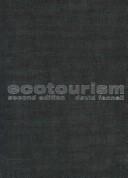
ISBN: 0415303656 0415303648 1134411367 1280046554 0203505433 9780203505434 9780203345894 0203345894 9780415303644 0203345894 9780415303651 0402035054 9780402035053 9781134411368 9781280046551 9781134411313 9781134411351 1134411359 Year: 2003 Publisher: London : Routledge,
Abstract | Keywords | Export | Availability | Bookmark
 Loading...
Loading...Choose an application
- Reference Manager
- EndNote
- RefWorks (Direct export to RefWorks)
Using a wealth of international case studies and photos, Ecotourism: An Introduction provides an accessible and comprehensive introduction to the key foundations, concepts and issues related to Ecotourism, the fasted growing segment of the global tourism industry. Among the topics covered are: * the foundations of ecotourism * tourism and ecotourism policy * the economics, marketing and management of ecotourism * the social and ecological impacts of tourism * ecotourism and development * the role of ethics in ecotourism The book includes case studies from Scotl
Ressource naturelle --- Natural resources --- Conservation des ressources --- Resource conservation --- Tourisme --- tourism --- Politique de l'environnement --- Environmental policies --- Gestion --- management --- Environnement socioéconomique --- socioeconomic environment --- Impact sur l'environnement --- Environmental impact --- Étude de cas --- case studies --- Mexico --- Canada --- USA --- Ecotourism. --- Geografie --- Toerisme sport recreatie --- Economische geografie --- Toerisme Sport Recreatie. --- Toerisme sport recreatie. --- Eco-tourism --- Eco-travel --- Ecological tourism --- Ecotravel --- Environmental tourism --- Green tourism --- Nature tourism --- Tourism --- management.
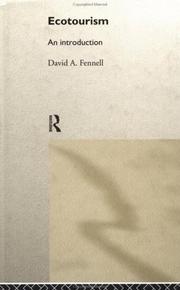
ISBN: 0415142377 0415201683 Year: 1999 Publisher: London : Routledge,
Abstract | Keywords | Export | Availability | Bookmark
 Loading...
Loading...Choose an application
- Reference Manager
- EndNote
- RefWorks (Direct export to RefWorks)
Ecotourism. --- Geografie --- Landschapskunde --- Milieu en ecologie.
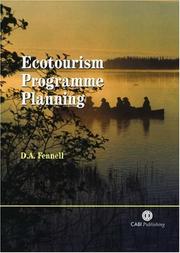
ISBN: 0851996108 9780851996103 Year: 2002 Publisher: Wallingford, UK: CABI,
Abstract | Keywords | Export | Availability | Bookmark
 Loading...
Loading...Choose an application
- Reference Manager
- EndNote
- RefWorks (Direct export to RefWorks)
Abstract:CHAPTER 1: RECREATION AND TOURISM- Leisure, recreation and tourism- Tourism products- Tourism programmes?CHAPTER 2: FOUNDATIONAL ASPECTS OF ECOTOURISM- Ecotourism- The ecotourist- Ecotourisms philosophical basis- The environment as a systemCHAPTER 3: THE PROGRAMME SETTING: GOING IN- Ecotourism supply- Resource management- Community development- Tourism ethicsCHAPTER 4: PROGRAMMING- Planning- Recreation programming- Programming ideology- Programming theories- Programme strategies- Programme approaches- The programming model- The programmer-Tour operatorsCHAPTER 5: NEEDS AND ASSETS- Motives (needs)- Needs assessment- Attractions- The business planCHAPTER 6: PROGRAMME DESIGN A: STRUCTURE- Designing the structure of the programme- Making programme design decisions- Designing the programmes interpretive componentCHAPTER 7: PROGRAMME DESIGN B: GEARING UP TO GO- Pre-trip information: Briefing- Health precautions- Persons with disabilities- Personal hygiene- First aid and survival- Permits- Environmental conditions- The trip planning sheetCHAPTER 8: PROGRAMME DESIGN C: LEADERSHIP AND RISK- Leadership- Approaches to leadership- Professional development- Safety and risk managementCHAPTER 9: IMPLEMENTATION- Program life cycle- Marketing- Quality- Staff training- Public relations- Budgeting- Implementation strategies- Schedules and itinerariesCHAPTER 10: EVALUATION- The scope of evaluation- Models of evaluation- Evaluation details and issues- Debriefing- Certification and accreditation- Environmental programmesCHAPTER 11: INTEGRATED ECOTOURISM PROGRAMME PLANNING: A SYNTHESIS- Integrated ecotourism programme planning- Final thoughts
Ecotoerisme. --- Ecotourism --- Heritage tourism
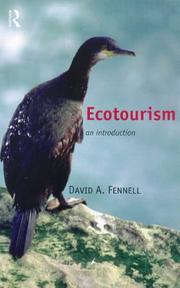
ISBN: 9780415201681 Year: 1999 Publisher: London Routledge
Abstract | Keywords | Export | Availability | Bookmark
 Loading...
Loading...Choose an application
- Reference Manager
- EndNote
- RefWorks (Direct export to RefWorks)
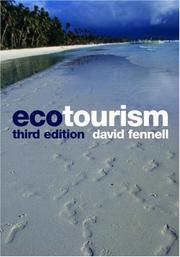
ISBN: 0415429315 9780415429313 9780415429313 0415429315 Year: 2008 Publisher: London: Routledge,
Abstract | Keywords | Export | Availability | Bookmark
 Loading...
Loading...Choose an application
- Reference Manager
- EndNote
- RefWorks (Direct export to RefWorks)
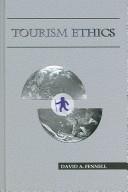
ISBN: 9781845410346 9781845410353 9781845410360 Year: 2006 Publisher: Clevedon [England] ; Buffalo [New York] : Channel View Publications,
Abstract | Keywords | Export | Availability | Bookmark
 Loading...
Loading...Choose an application
- Reference Manager
- EndNote
- RefWorks (Direct export to RefWorks)
Tourism --- Tourisme --- Social aspects. --- Moral and ethical aspects. --- Aspect social --- Aspect moral
Book
ISBN: 1134634595 1280335483 020345748X Year: 1999 Volume: No. 16 Publisher: London ; New York : Routledge,
Abstract | Keywords | Export | Availability | Bookmark
 Loading...
Loading...Choose an application
- Reference Manager
- EndNote
- RefWorks (Direct export to RefWorks)
Ecotourism. --- Tourism.
Book
ISBN: 9780415829656 Year: 2015 Publisher: London Routledge
Abstract | Keywords | Export | Availability | Bookmark
 Loading...
Loading...Choose an application
- Reference Manager
- EndNote
- RefWorks (Direct export to RefWorks)
Book
ISBN: 1003001769 1003001769 100043365X Year: 2021 Publisher: Oxon, UK ; New York, NY : Routledge, Taylor & Francis Group,
Abstract | Keywords | Export | Availability | Bookmark
 Loading...
Loading...Choose an application
- Reference Manager
- EndNote
- RefWorks (Direct export to RefWorks)
"This handbook presents a timely, broad-ranging and provocative overview of the essential nature of ecotourism. The chapters will both advance the existing central themes of ecotourism and provide challenging and divergent observations that will thrust ecotourism into new areas of research, policy and practice. The volume is arranged around four key themes: sustainability, ethics and identity, change, conflict and consumption, and environment and learning, with a total of 28 chapters. The first section focuses on sustainability as a core ecotourism criterion, with a primary focus on some of the macro sustainability issues that have an impact on ecotourism. Foremost among these topics is the linkage to the UNs sustainable development goals, which have relevance to ecotourism as one of the greenest or most responsible forms of tourism. The chapters in the second section provide a range of different topics that pull ecotourism research into new directions, including a chapter on enriching indigenous ecotourism through culturally sensitive universalism. The third section includes chapters on topics ranging from persons with disabilities as a neglected body of research in ecotourism, to ecotourism as a form of luxury consumption. The final section emphasises the link between ecotourism and learning about the natural world, including a deeply theoretical chapter on rewilding Europe. With contributions from authors around the world, this handbook gives a global platform to local voices, in both developed and emerging country contexts. The multidisciplinary and international Routledge Handbook of Ecotourism will be of great interest to researchers, students and practitioners working in tourism and sustainability"--
Book
ISBN: 0429346298 1000049280 Year: 2020 Publisher: London ; New York, New York : Routledge,
Abstract | Keywords | Export | Availability | Bookmark
 Loading...
Loading...Choose an application
- Reference Manager
- EndNote
- RefWorks (Direct export to RefWorks)
| Listing 1 - 10 of 30 | << page >> |
Sort by
|

 Search
Search Feedback
Feedback About UniCat
About UniCat  Help
Help News
News